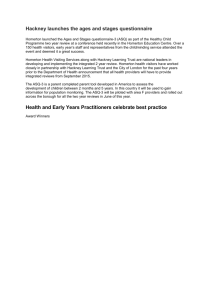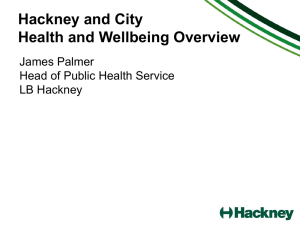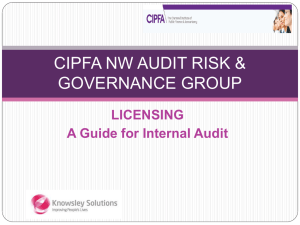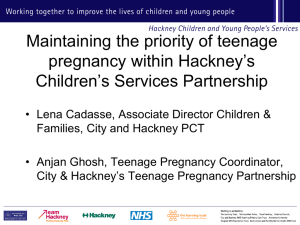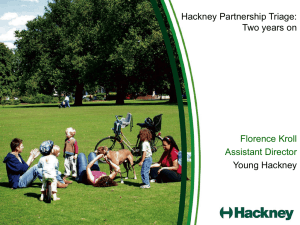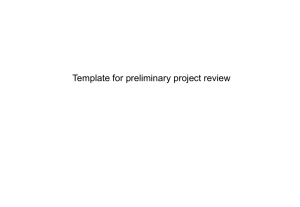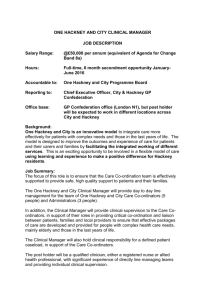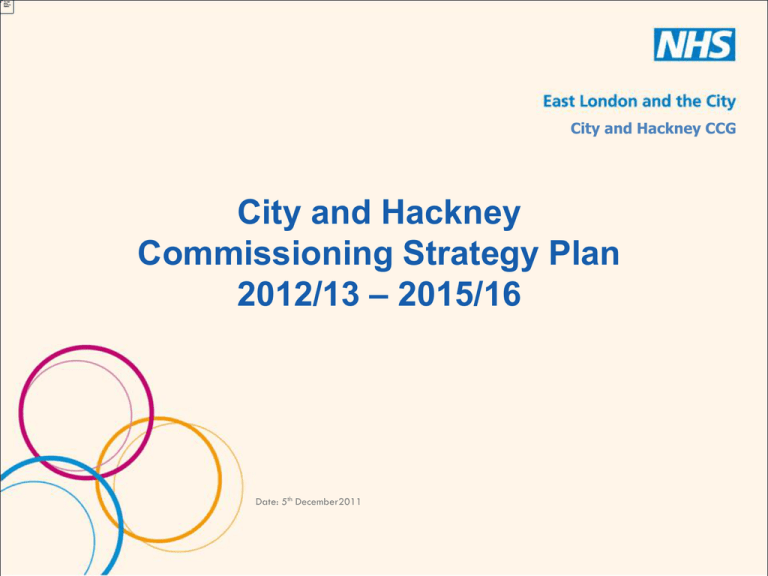
City and Hackney CCG
City and Hackney
Commissioning Strategy Plan
2012/13 – 2015/16
Date: 5th December2011
Background
•
The Commissioning Strategy Plan (CSP) sets out our strategic
priorities for improving the health and well-being of City and
Hackney residents over the next 3 years (2012/13 – 2015/16).
•
This is a refresh of the CSP from last year.
•
In April 2011, two Clinical Commissioning Group (CCG)
Pathfinders were approved - East London Integrated Care (ELIC)
and KLEAR Healthcare Consortium.
•
From October 2011, the two CCGs jointly took responsibility for
commissioning acute, community and mental health services and
prescribing.
•
The two Pathfinders are working closely together to deliver their
delegated responsibilities and are planning to apply for
authorisation as one new CCG covering City & Hackney and
including all GP practices, in 2012.
•
The two CCGs have taken a lead role in the development of the
CSP and have actively engaged practices and secondary care
clinical colleagues.
1
Our Vision for City and Hackney
Our Vision
Our
Strategic
Aims
To create a healthier future for the people of
City and Hackney
1. Improve the health and well-being of our population,
reducing the incidence and burden of ill-health to
improve life expectancy and quality of life;
2. Work collaboratively with our local communities and
partners to reduce health inequalities;
3. Deliver sustainable improvement in the quality,
responsiveness and access to local healthcare
services, reducing the use of secondary care where
clinically appropriate;
4. Improve the patient experience, increasingly offer
greater choice and continuity of care provided by a
skilled workforce;
5. Improve productivity and efficiency across the health
care system to ensure value for money;
2
Case for Change
i)
•
Demographics and health needs
•
Number of pressing health needs in the locality eg: high levels of
childhood obesity, prevalence of severe mental health conditions,
late presentation for cancer and deaths from heart disease and
stroke
•
Challenges should be seen in the context of significant
improvements in the last year
City and Hackney faces significant health and wellbeing
challenges; Hackney is the second most deprived borough in
England and there are pockets of high deprivation in the City
ii) Quality
• Currently underperforming against some key national targets eg:
mixed sex wards, maternity and childhood immunisations
•
Continued improvements need to be made in terms of access,
clinical quality and patient experience
iii) Finance
•
£8-10m savings required in 2012/13 to maintain financial balance
and deliver a sustainable health service going forward
•
Our planning has assumed we need to identify efficiencies of 3%
to meet this challenge.
3
Improvement Priorities - Overview
Staying healthy
Children and young people
Adults
Vulnerable groups
Improving
primary care
GP
Pharmacy
Dental
Optometry
Improving local
health services
Planned care
Urgent care
Integrated care - children
Integrated care - adults and older people
Maternity
Continuing care
End of life
Mental health
Prescribing
Improving
specialist
health services
Working closely with the London Specialist Commissioning Group
(LSCG) to review the finance and service implications of implementing
the national definition/requirements of specialist services in April 2013
4
Staying Healthy – Children and Young People
Drivers for change:
• Childhood immunisation coverage is second lowest in London
• Rates of sexually transmitted infections are second highest in the country
• 25% of Year 6 children are obese; 15% are overweight
• Number of 3 year olds with tooth decay has risen
Overall objective:
• Build on the progress made to date in tackling health inequalities; step up performance in areas
where significant need remains
Actions/changes proposed
• Provide support to GP practices with lowest childhood immunisations uptake
• Communications plan to promote immunisation across City and Hackney
• Continue to make use of the London wide condom distribution scheme
• Distribute evidence-based information on sex and relationships to all schools
• Extend the healthy start vitamins scheme to all pregnant and lactating women and children <4
• Continue ‘growing project’ and ‘cook and eat’ programmes on deprived housing estates
• Implement fluoride varnish scheme
Outcomes
Health
needs
• Increase childhood immunisation rates (Primary course 91% by age 1, MMR1 88% by age 2,
MMR2 80% by age 5, HPV vaccine uptake 70%)
• Screen 25% of 16-25s for chlamydia; maintain high positivity rates (>26/1000)
• Reduce rates of dental decay
Finance
Net savings of £224k in 12/13 (across all staying healthy initiatives)
5
Staying Healthy – Adults and Older People
Drivers for change:
• Smoking prevalence is higher than the national average
• Proportion of adults who are overweight/obese is above the national average
• Uptake of cancer screening programmes remains lower than the national average
• 1 in 11 people in City and Hackney have high blood pressure
Overall objective:
• Build on the progress made to date in tackling health inequalities; step up performance in areas where
significant need remains
Actions/changes proposed
• Continue smoking cessation support services eg: at Homerton, Hackney council etc...
• Tobacco Alliances to focus on preventing young people taking up smoking
• Continue ‘growing project’ and ‘cook and eat’ programmes on deprived housing estates
• Implement ‘small c’ campaign to raise awareness of cancer symptoms in targeted populations
• Improve uptake of cancer screening, through working with GPs, list cleaning and providing information
directly to residents
• Ensure NHS Health Checks are more widely available through GPs, pharmacies and the voluntary sector
Outcomes
Health
needs
•Increase level of smoking quitters to >2000
•Increase uptake of cancer screening programmes; breast screening 70%, bowel screening
43% and cervical screening 74%
•20% of target group invited to NHS Health Checks programme
Finance
Net savings of £224k in 12/13 (across all staying healthy initiatives)
6
Staying Healthy – Vulnerable Groups
Drivers for change:
• 138 new diagnoses of HIV in 2009
• Evidence that undiagnosed domestic violence results in additional use of health resources
• Nationally, people with learning disabilities and mental health problems are more likely to
die of preventable diseases
Overall objective:
• Build on the progress to date; step up performance in areas where significant need remains
Actions/changes proposed
• Continue to commission Open Doors Service to meet the needs of sex workers
• Pilot innovative promotion re: early diagnosis of HIV eg: through working with Hackney African Forum
• Finalise a randomised control trial of patient HIV testing in primary care
• Roll-out evidence-based primary care domestic violence programme (IRIS) to a further 12 practices
• Increase support to GPs to identify people with learning disabilities and refer them to services for
appropriate support
• Improve flu immunisation amongst at risk groups
• Mental Health Prevention Strategy (see Mental Health)
Outcomes
Health
needs
• Increase identification of, and support to, victims of domestic violence
• Increase identification of, and support to, people with learning disabilities
• Improve flu immunisation uptake – 75% for >65s, 75% for <65s in high risk groups
Finance
Net savings of £224k in 12/13 (across all staying healthy initiatives)
7
Improving Primary Care (GP, Dental, Optometry & Pharmacy)
Drivers for change:
• Significant variation between provider performance at practice level
• Opportunity to build on strong CCG track record of quality improvement in primary care
Overall objective:
• Continued improvement in the accessibility, quality and productivity of primary care services, through
enhanced performance management, contractual compliance and procurement/redesign of services in
line with health needs
Actions/changes proposed
• Implement quality scorecards - General Practice, Dentistry, Optometry and Community Pharmacy
• Improve urgent care access; improve interface between primary care, out of hours and urgent care. Improving access a
central part of ‘111’ initiative (see Urgent Care)
• Commission minor oral surgery service from primary care providers
• Review 8 PMS contracts; gain productivity benefits and standardise price/patient
• Ensure GP lists are up to date and contain the correct information
• Review Enhanced Services in General Practice, ensuring in line with core national offer
• Complete audit of local eye care services with redesign of pathways as appropriate
• Secure new GP out of hours provision, in line with the urgent care strategy
• Procure/re-procure: The Greenhouse, Allerton Road Surgery, Sorsby Health Centre, Out of Hours Emergency Dental
Services and 2x Orthodontics contracts
Outcomes
Health needs
• Secure additional provision in line with health needs
Quality
• Improve access to primary care
• Improve performance against quality indicators eg: screening and immunisations
Finance
Net savings of £578k in 12/13
8
Planned Care
Drivers for change:
• Significant variation in provider performance across 3 main hospitals (Homerton, BLT and UCLH)
• Opportunity to build on strong CCG track record of reducing outpatient activity, with
continued focus on reducing variation between practices
Overall objective:
• Drive acute providers to performance within the top 25% in the country for consultant to consultant
referrals and new:follow-up rates in 2012/13, and to the top 10% by 2014/15
Actions/changes proposed
• Continue to review appropriateness of consultant to consultant referrals; focus on BLT and UCLH
• Reduce new:follow-up ratios at HUHT, BLT and UCLH across a range of specialties to national benchmark best practice
• Implement range of initiatives to address quality improvement priorities - patient experience, consultant review within 12
hours of admission, elective surgery cancellations and discharge letters
• Commission telephone clinics for test results (where appropriate) across HUHT, BLT and UCLH
• Continue to support practices to review their referral rates e.g. clinical audits and peer review
• Review options for tier 3 high intensity non-surgical weight management service as an alternative to bariatric surgery
Outcomes
Quality
•
•
•
•
Finance
Ensure patients get seen and treated in the right place, at the right time;
0.5% reduction in first outpatient attendances;
Reduction of 36,000 follow ups at Homerton and reduction of follow ups at BLT and UCLH in a prioritised
group of specialties
Reduction in those referred for bariatric surgery
Net savings of £3.09m in 12/13
9
Urgent Care
Drivers for change:
• Existing urgent care system is complex with significant duplication across services
• Current model often does not meet the needs of patient and is not provided in a cost effective way
Overall objective:
• Improve outcomes through system redesign to create a system that is responsive, efficient and supports
people in managing their own condition wherever appropriate
Actions/changes proposed
•Improve primary care access (see Improving Primary care)
• Review walk-in centre provision in North East Hackney. These services will potentially be
decommissioned from late 2012, subject to further stakeholder engagement and decision making
• Implement 111 as a single point of access supported by a comprehensive directory of service in early
2012/13, including all out of hours GP call handling
• Procure integrated 24/7 urgent care service in line with ‘phone first’ and primary care first model of care
Outcomes
Quality
• Improve access to urgent healthcare services; ensure patients get seen and treated
in the right place, at the right time, first time round
Finance
Net savings of £825k in 12/13
10
Integrated Care – Children & Young People
Drivers for change:
• Large young population – 27% residents <20
• Increasing <5 population
• Young people in City & Hackney have higher and more complex needs than national average
Overall objective:
• Ensure the best start in life for all; strengthen services for vulnerable children and families by building links
between health and social care
Actions/changes proposed
• Continue to implement Healthy Lifestyle Programme – fitness, food skills and exercise initiatives for
children and parents (see Staying Healthy)
• Develop local enhanced service; focus on improving identification of vulnerable children and families and
pro-active co-ordination of services to best promote their care
•Expand and strengthen health visiting services in line with the requirements set out in the Department of
Health’s “A Call to Action”
• Review and redesign asthma, epilepsy and sickle cell care pathways to promote and integrate care
between primary and secondary services
Outcomes
Quality
• Increase number of assessments and interventions offered by health visiting service
• Reduce A&E and Urgent Care Centre attendances at 3 main local hospitals
• Reduce ambulatory sensitive admissions
Finance
Investment of £700k in 12/13
11
Integrated Care – Adults & Older People
Drivers for change:
• >65s represent 8% of total population
• Premature deaths from coronary heart disease (CHD) higher than in London as a whole
• Recorded prevalence of hypertension is increasing
• Death rate from Chronic Obstructive Pulmonary Disease (COPD) in Hackney is high
Overall objective:
• Improve integration of health and social care provision, supporting residents to remain healthy and
independent for as long as possible
Actions/changes proposed
• HUHT to deliver 2.5% efficiency requirement as part of the transfer of Community Health Services to HUHT
• Joint review of intermediate care and re-ablement services; inc exploration of a new integrated model with a
single point of access
• Implement new pathways for asthma, heart failure, hypertension and tuberculosis in primary care
• Commission COPD Team to work with GPs in the management of patients following discharge from hospital
• Commission further consultant case reviews of diabetes patients with complex needs
• Continue to implement education programme to support GPs with management of patients with CHD
• Develop effective psychological intervention services and a “key worker” role for sickle cell patients
Outcomes
Quality
• Timely discharge; reduce length of stay
• Reduce admissions to residential/nursing home care
• Reduce A&E attendances and short stays in hospital
Finance
Net savings of £1.3m in 12/13
12
Maternity
Drivers for change:
• Birth rate is higher than the national average
• Underperforming against a number of key quality indicators eg: early booking, breastfeeding, and
caesarean section rates
• Increase in variation in the cost of maternity pathways across 3 main local hospitals
Overall objective:
• Improve the quality of maternity care, ensuring that women’s health needs and choices are appropriately
managed and met, reducing the need for antenatal admissions
Actions/changes proposed
• Review additional payments above PbR to HUHT to release efficiency savings
• Reduce antenatal attendances at Homerton in line with best practice guidance
• Ensure a consistent service offer; commission same care pathway across BLT, UCLH and Homerton
• Commission extension to consultant advice service to include closer links between obstetricians in
secondary care and GPs
• Review community midwifery service and working arrangements with GPs
• Deliver a social marketing initiative to facilitate early booking and contact with maternity services
Outcomes
Quality
• 2% increase in number of women being offered choice of provider and delivery setting
• 2% reduction in caesarean section rates at Homerton Hospital
• Increase in proportion of women presenting within 12 weeks, 6 days
• 5% improvement in patient experience, as measured by Care Quality Commission (CQC),
Trust and Cluster surveys
Finance
Net savings of £496k in 12/13
13
Continuing Care
Drivers for change:
• Continued implementation of the 2007 Department of Health directive which outlined a new
Continuing Care framework, introducing choice of placement for patients
Overall objective:
• Ensure that all eligible patients are able to access high quality continuing care and are supported to
make choices about their placements
Actions/changes proposed
• Review provision in Mary Seacole and Cedar Lodge, with a view to moving Cedar Lodge continuing care
patients into alternative care settings, following consultation with patients, families and carers
• Appraise Continuing Care at Home Team and explore options to enhance service offer and cost per case
• Improve continuing care pathways, particularly for fast track patients
Outcomes
Quality
• Ensure access to high quality continuing healthcare for all eligible patients
• Enable increased patient choice re: care placements
• Reduce the number of complaints/appeals against continuing healthcare decisions
Finance
Net savings of £400k in 12/13
14
End of Life Care
Drivers for change:
• In 2010/11, 56% of deaths occurred in hospital; this is contrary to most people’s preference
to be cared for at home
• Local consultation indicates that a ‘good death’ is not a reality for everyone; some people
experience physical, psychological, social and spiritual distress and many do not live out their final days in
their preferred place of care
Overall objective:
• Deliver high quality care to people at end of life, supporting them to live and die in their place of choice
Actions/changes proposed
• Explore development of a lead provider for end of life care across East London and the City
• Improve the co-ordination of care across service providers, through implementation of the end of life care
register and multi-disciplinary meetings in the community
• Implement training to support practitioners to initiate difficult conversations, break bad news and support
patients to identify their preferences for care
• Review availability of services in the community ie: psychology, out of hours nursing and pharmacy
• Review access to respite care
• Review end of life experience and provision for people with learning disabilities and/or mental health
issues
Outcomes
Quality
• Sustain 4% increase in the number of people who have been supported to die at home
• 5% increase in quality of care provided to patients at the end of life
15
Mental Health
Drivers for change:
• City & Hackney experiences one of the highest levels of mental health need in the UK
• 2011/12 Whole Systems Review found significant opportunities for increasing quality and
value for money
Overall objective:
• Improve outcomes through system redesign; shift towards primary care based provision and a
strengthened approach to primary and secondary prevention
Actions/changes proposed
• City and Hackney CCG, in partnership with East London Foundation Trust (ELFT), to develop
primary/secondary health and social care pathways
• Reshape prevention services, in conjunction with voluntary sector providers
• Implement findings and recommendations from dementia consultation and Whole Systems Review
• Review and reduce mental health contracts for out of borough provision
• Implement London-wide commissioning intentions, including introduction of Payment by Results, data
requirements for psychological therapies services and CQUIN schemes
Outcomes
Quality
• ELFT bed occupancy to be maintained <93%
• Improve ELFT performance in CQC Community Patients Survey
• Improve access to, and productivity of, secondary care psychological therapies services
• Improve access to early intervention in psychosis
Finance
Net savings of £1.6m in 12/13
16
Prescribing
Drivers for change:
• Cost pressures from within the system eg: newly licensed drugs, new NICE guidance
and Individual Funding Requests (IFR)
• City and Hackney has 3 red rated indicators on the NHS London Medicines dashboard for insulin
analogues, blood glucose monitoring and specialist drugs
Overall objective:
• Support high quality, safe, evidence based prescribing, ensuring the prioritisation of drugs that will reduce
the costs of morbidity and mortality for patients
Actions/changes proposed
• Continue to support GP practices through educational sessions, medicines information service, audits,
formulary development and monitoring of specialist drugs
• Continue to provide professional input unto the North East London Medicines Management Network. This
group considers high cost, low volume medicines which are excluded from Payment by Results (PbR) and
have not received formal guidance from NICE.
• Implement policy to use human NPH insulin as first line insulin choice in patients with type 2 diabetes
• Review use of self-monitoring of blood glucose in patients with type 2 diabetes
• Implement new guidelines on the appropriate management of vitamin D deficiency in primary care
Outcomes
Finance
Net savings of £945k in 12/13
17
Summary of Financial Impact
•
As outlined in the case for change, City and Hackney needs to meet a financial gap of circa
£8m in 2012/13 and a cumulative gap of circa £18m by 2014/15.
•
The initiatives within the Commissioning Strategy Plan exceed this, yielding savings of
£8.8m in 2012/13 (see below), with a cumulative effect of £26.4m by 2014/15.
£3,500,000
£3,000,000
£2,500,000
£2,000,000
£1,500,000
£1,000,000
£500,000
£0
Staying
Healthy
Primary Care
Planned
Care
Urgent Care
Int Care:
Int Care:
Children&YP Adults&OP
Maternity
Continuing
Care
End of Life
Care
Mental
Health
Prescribing
-£500,000
-£1,000,000
18
Next steps
November 2011 – January 2012:
•
Stakeholder engagement – Overview and Scrutiny Committees
(OSCs), Local Involvement Networks (LINKs)
•
Any changes in response to NHS Operating Framework
2012/13
•
On-going local development of the CSP – final deadline for
submission of the CSP to NHS London is end of January 2012
January – March 2012:
•
Development of implementation plans and preparation for
negotiation of contracts with providers
April 2012 onwards:
• Implementation
• Continue to develop and review the CSP over the next 2-3 years
to prioritise investment and explore areas where we can improve
health, reduce inequalities, improve patient experience and
deliver efficiencies.
19

